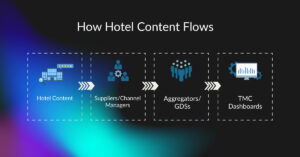Hotel content errors often go unnoticed until they are not. A misplaced pin on the map, a missing Wi-Fi icon, or an outdated cancellation policy can derail a business trip, trigger policy violations, and put SLAs at risk.
For Travel Management Companies (TMCs), the stakes are high. Clients expect seamless, compliant experiences for every traveler, every time. Yet poor-quality listings in GDS systems continue to cause last-minute escalations and hidden costs. This isn’t just about fixing bad data; it’s about protecting traveler trust and meeting the operational standards your clients demand.
In this blog, we explore how inaccurate hotel content disrupts business travel, impacts SLA compliance, and erodes traveler trust. We also offer insights for B2B travel platforms looking to fix content issues at the source.
TL; DR
- Inaccurate hotel content in GDS platforms leads to policy violations, booking errors, and poor traveler experiences.
- Common issues like wrong geo-tags, missing amenities, and inconsistent room types directly impact SLA compliance.
- TMCs face reputational and contractual risks when hotel listings cause non-compliant bookings or traveler dissatisfaction.
- Manual fixes don’t scale; content issues multiply across multiple suppliers and platforms.
- Standardized, enriched hotel content is essential for accurate search results, compliant bookings, and consistent service delivery.
- Solutions like Vervotech help clean, map, and standardize hotel data at scale, quietly powering SLA-compliant, traveler-friendly systems.
Understanding the Ecosystem: Hotel Content Flows in Managed Travel

In the managed travel space, hotel content flows through a complex supply chain before it reaches the end user.
At a glance, this content might seem straightforward: a hotel name, a few images, a description, pricing, and a cancellation policy. But in reality, each listing involves a collection of structured and unstructured data fields that must be accurate, consistent, and up to date for the booking experience to work as intended.
Hotel content typically originates from suppliers, channel managers, or hotel chains, then passes through aggregators and Global Distribution Systems (GDSs) before being surfaced in corporate booking tools, expense platforms, or TMC dashboards.
At each stage, this data is reshaped, reclassified, and merged with other sources. Inconsistencies or gaps introduced early in this chain often go undetected, but their effects compound downstream.
Travel Management Companies rely heavily on GDS platforms to provide hotel options that comply with client travel policies. These listings must reflect real-time availability, accurate location coordinates, amenity information, and contractual rates. Any discrepancy, like a hotel tagged in the wrong city zone or a missing indicator for mandatory amenities, can cause travelers to book outside policy or choose non-compliant suppliers without realizing it.
Business travel programs also require additional metadata for effective policy enforcement: proximity to office or event locations, compliance tags (e.g., sustainability-certified hotels), negotiated rate flags, and policy-approved suppliers. Without enriched and standardized hotel content, it becomes nearly impossible for TMCs to uphold the service levels promised to clients.
The challenge isn’t just about accessing hotel data; it’s about ensuring that this data is clean, correctly categorized, and unified across platforms. For managed travel to operate efficiently, hotel content must flow through the ecosystem without losing fidelity. Any loss of accuracy at one stage introduces friction at the next, from poor search results in the booking tool to SLA violations at the reporting stage.
Ultimately, content accuracy isn’t a background technical issue; it’s foundational to how TMCs function. And when hotel data is fragmented or incorrect, the impact quickly follows.
While the hotel content journey seems straightforward, even minor gaps in this chain can trigger major breakdowns. The next section explores how seemingly harmless listing errors inside GDS platforms can snowball into costly operational problems for TMCs and their clients.
How Small Errors in GDS Listings Turn into Big Problems
On the surface, a missing amenity or slightly inaccurate location tag in a hotel listing may seem like a minor issue. But in the world of business travel, where speed, accuracy, and policy compliance are critical, these small content errors can trigger a cascade of operational failures. GDS platforms serve as the central booking infrastructure for TMCs, and any flaws in the hotel data they serve get amplified as they move through corporate booking systems, mid-office tools, and traveler-facing platforms. Let’s take a closer look at the most common ones:
1. Wrong Location = Policy Violations
One of the most common issues is geo-tagging errors. A hotel listed as being within a business district might actually be several kilometers away, leading travelers to book properties that appear policy-compliant but don’t meet client requirements. In turn, TMCs face compliance breaches, increased transport costs, and client complaints. For travel managers, it becomes a compliance headache. For the traveler, it creates friction and frustration.
2. Incomplete Room Details = Booking Errors
Another most frequent problem is that of inconsistent or incomplete room details. Vague room details like “Standard” often miss key differentiators; some rooms include breakfast, others don’t; some are refundable, others aren’t. Without standardized content, the GDS surfaces duplicate or conflicting listings, forcing agents and travelers to make booking decisions with incomplete or misleading information.
3. Missing Amenities = Bad Traveler Experience
The accuracy of amenities mentioned in a hotel description also has a lot to do with travelers’ experience, especially business travelers. They expect basic amenities like Wi-Fi, a workstation, and early check-ins. If the hotel descriptions do not mention these services, or mention them despite them being non-existent, or worse, if the listing doesn’t match the brand standard promised in a corporate contract, it can lead to misleading expectations, erode travelers’ trust, and hamper their productivity. This can further trigger formal complaints or refund requests.
4. Incorrect Cancellation Policies = Financial Losses
Cancellation policies are another high-risk aspect that impacts business travel. If the GDS hotel listings are not in sync with the hotel’s cancellation policy, travelers may end up making a non-refundable booking when they’re supposed to make a flexible one under their company guidelines. Such a discrepancy can result in unnecessary costs, internal escalations, and, in some cases, SLA breaches.
5. Duplicate Listings = Confusion and Frustration
When the same hotel appears multiple times under slightly different names or content, it clutters the search results. This wastes time, increases booking errors, and reduces trust in the booking platform.
Even if these issues seem minor individually, they may add up and scale fast when left unchecked, especially when you’re managing thousands of bookings a month. For TMCs, every inaccurate listing chips away at service quality, increases manual effort, and puts client relationships at risk. What’s worse is that these issues can expose TMCs to SLA violations and reputational risk when clients expect precision and reliability from their travel partners.
This is why a standardized and accurate hotel inventory is necessary to build the foundation for quality service delivery in a highly structured environment. Small issues that start in a GDS feed, but their impact may reach beyond the screen.
But that’s just the tip of the iceberg. The real concern is how these content issues quietly undermine corporate travel policies and lead to compliance failures. Here’s where things get serious.
How Inaccurate Content Derails Non-Compliance
Let’s start by understanding that business travel isn’t optional; it is contractual. Businesses have strict travel policies to control the cost of travel, ensure duty of care, and provide a seamless traveler experience. But when hotel data is flawed, the policies tend to break down.
For example, let’s consider location compliance. A hotel incorrectly mapped in a policy-approved location may lead to hotel bookings that seem non-compliant, but they actually aren’t. It results in missed proximity requirements, increased travel expenses, and audit errors. Similarly, incorrect hotel listings that aren’t refundable or come from unverified hotel suppliers cause travelers to make bookings that breach the policies without even realizing it.
The worrisome part here for TMCs is that compliance failures often don’t surface until reaching the post-trip audit stages, traveler complaints, or client reviews. At this point, there’s little room for proactive service, but damage control. For TMCs, this doesn’t turn into a workflow problem; it becomes a credibility problem.
It’s clear that poor hotel content puts compliance, trust, and service delivery at risk. But solving the problem takes more than patchwork fixes. The answer lies in rebuilding the data foundation at scale.
Also Read: What Is A Hotel Booking API And How Can You Use It To Improve Customer Experience?
Fixing the Foundation: Enabling Content Accuracy at Scale
Inaccurate hotel data doesn’t just impact hotel bookings; it impacts compliance, traveler trust, and your business’s bottom line. Unreliable, unstandardized, and inaccurate hotel data puts TMCs in a tough spot to meet corporate clients’ expectations.
That said, hotel content accuracy isn’t just a surface-level fix, but foundational and must be fixed at the source. And the scale and complexity of today’s travel ecosystems demand more than manual checks or piecemeal corrections. This means deduplicating the listings, fixing geo-location accuracy, aligning room types across providers, and flagging policy-critical details like cancellation terms, amenities, etc., as essential drivers of compliance.
But the challenge here is that most business travel platforms and booking platforms don’t own & operate the hotel content pipeline. As mentioned earlier, the hotel content flows through different stages before arriving at the final booking platform.
So, they depend on multiple suppliers, each with their own clusters of formats, naming conventions, and at this volume, it is difficult to scale manual mapping. This is where automated mapping solutions become essential.
Industry-leading mapping solutions like those provided by Vervotech are designed to handle exactly this kind of problem quietly, behind the scenes. Through intelligent AI-native hotel mapping & room mapping solutions, it ensures hotel listings remain consistent, deduplicated, and 99.999% accurate. It even adds a second layer of mapping verification- DualMap, which verifies every hotel booking at the pre-booking and post-booking stage to flag any booking errors.
Integrating solutions like Vervotech helps travel businesses stay policy-compliant, no matter the source. For TMCs, this means fewer booking errors, reduced manual interventions, and better alignment with client SLAs.
In a high-stakes environment like TMCs, clean content is the backbone of reliable, SLA-compliant travel operations. Fixing hotel content at the source with intelligent mapping solutions enables every piece of the seamless booking puzzle to come together and work as it should, from smart search filters to confident traveler experiences. It’s not just a data upgrade; it’s operational insurance.
Want to eliminate hotel content-related SLA risks?
See how Vervotech can help standardize and enrich your hotel listings at scale.
Frequently Asked Questions (FAQs)
What kinds of errors in hotel content cause the most problems for TMCs?
Incorrect location data, duplicate listings, vague room type descriptions, outdated amenities, and mismatched cancellation policies are among the most common and disruptive errors.
How do these content issues impact SLA compliance?
They lead to bookings that violate corporate travel policies, such as staying outside approved zones or selecting non-compliant rates, which can result in SLA breaches, client dissatisfaction, and financial penalties.
Why can’t TMCs or booking platforms fix this manually?
Hotel data comes from multiple sources, each with different formats and update cycles. Manual review and cleanup don’t scale and introduce inconsistencies and delays.
How does standardized content help with compliance?
It ensures that every listing is consistent, searchable, and policy-ready, allowing travel managers to enforce rules, surface only approved options, and reduce booking errors.
What role does Vervotech play in solving this issue?
Vervotech provides automated hotel mapping and content standardization solutions that clean and unify hotel data across suppliers, helping TMCs deliver accurate, compliant, and traveler-friendly listings.
What’s the business impact of improving hotel content accuracy?
Better data leads to fewer escalations, higher traveler satisfaction, reduced refund requests, and stronger client retention for TMCs.







